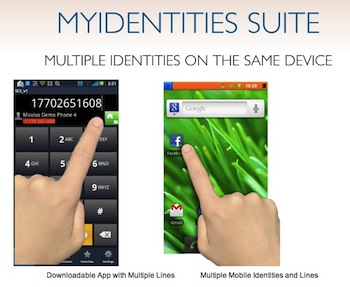Mobile operators are being offered a white-label app that would enable them to offer users multiple phone numbers, tied to separate iDs, on a single phone.
The app doesn’t require users to use a Dual-SIM phone or activate a second SIM identity, or use the data channel (VoIP) for the alternative number as many OTT voice services do. Instead, intelligence is handled between an on-device client and a network server to handle number translation, so that incoming and outgoing calls can be routed over the TDM (voice) network and carry the chosen caller iD.
As an example, a user might have a number associated with their personal iD, and one for work. If someone calls the work number, it shows on the phone screen as coming for the work number. If the same person initiates a call using that work number, then the call will be routed through the Movius server, and onto the network bearing the “work” iD.
Call history and even billing can be kept separate, so that users can keep their accounts separate, if need be.
Another use case might be a user porting their fixed number to be a second mobile number, cancelling their fixed contract but keeping their fixed number as a second line. Or a user could deploy a temporary second number when they are selling something online, Movius said.
A further use case is for roaming – where an operator could issue a second, local, number for a user that travels regularly to a certain country. That second number can then be billed at local rates.
Movius’ Jose Romero said that the app, named MyIdentities, offers operators a way to profit from BYOD trends, as well as increasing requirements amongst users to keep parts of their social life separate. Romero drew a parallel between the common habit of having multiple email accounts so users can manage online transactions, or personal life, or social network accounts. Why not have the same for phone numbers, he asked?
Although Movius is working right now with carriers, it is also looking at an “OTT” D2C version of the app, Romero said. Although the original featurephone app required integration with the operators’ own switches, the smartphone version is much lighter on integration to the operator core, Romero said.
Movius is positioning the app as a potential revenue generator for operators – either because they generate extra minutes or usage, or perhaps by treating the second number as a second line rental. Romero said that in Latin America have seen ARPUs lift by as much as 20% after a customer takes a second number.
The app is available for evaluation by operators now, and is available for Android and iOS devices.



